British Airways Marketing Plan: Analysis, Barriers & Implementation
VerifiedAdded on 2023/04/04
|11
|3388
|305
Report
AI Summary
This report provides a comprehensive marketing plan analysis for British Airways, focusing on strategic planning, barriers to implementation, and ethical considerations. It evaluates the changing perspectives in marketing planning, assesses the organization's capability for future marketing activities, and examines techniques for organizational auditing and external factor analysis. The report identifies key barriers to marketing planning and suggests strategies to overcome them. It also delves into new product development techniques, pricing policies, distribution strategies, and communication mixes. Furthermore, the report analyzes the influence of ethical issues on marketing planning, providing examples of organizational responses to ethical dilemmas and the impact of consumer ethics. The importance of top management support for successful marketing plan implementation is also highlighted. Access this detailed report and more solved assignments on Desklib.

Marketing Planning
Paraphrase This Document
Need a fresh take? Get an instant paraphrase of this document with our AI Paraphraser
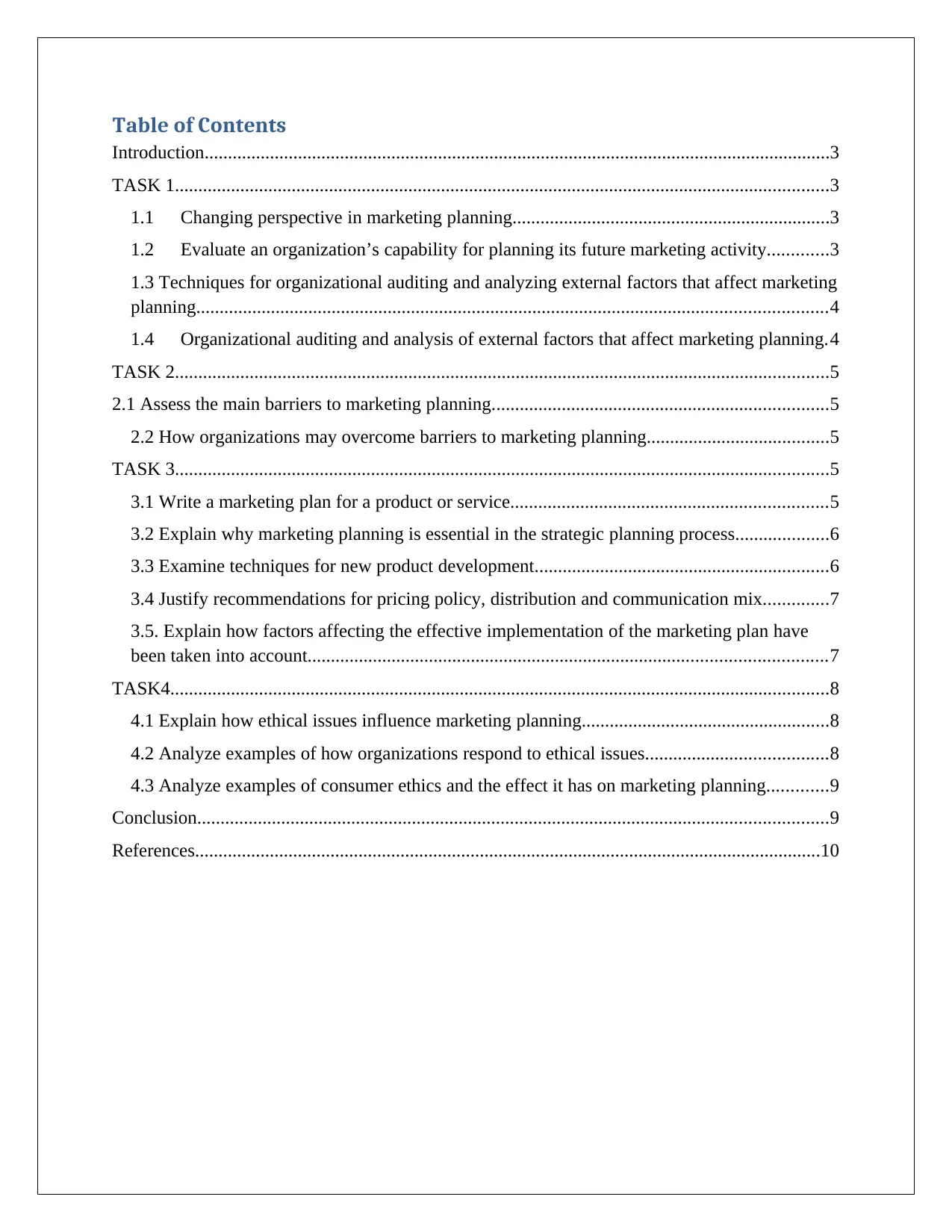
Table of Contents
Introduction......................................................................................................................................3
TASK 1............................................................................................................................................3
1.1 Changing perspective in marketing planning....................................................................3
1.2 Evaluate an organization’s capability for planning its future marketing activity.............3
1.3 Techniques for organizational auditing and analyzing external factors that affect marketing
planning.......................................................................................................................................4
1.4 Organizational auditing and analysis of external factors that affect marketing planning.4
TASK 2............................................................................................................................................5
2.1 Assess the main barriers to marketing planning........................................................................5
2.2 How organizations may overcome barriers to marketing planning.......................................5
TASK 3............................................................................................................................................5
3.1 Write a marketing plan for a product or service....................................................................5
3.2 Explain why marketing planning is essential in the strategic planning process....................6
3.3 Examine techniques for new product development...............................................................6
3.4 Justify recommendations for pricing policy, distribution and communication mix..............7
3.5. Explain how factors affecting the effective implementation of the marketing plan have
been taken into account...............................................................................................................7
TASK4.............................................................................................................................................8
4.1 Explain how ethical issues influence marketing planning.....................................................8
4.2 Analyze examples of how organizations respond to ethical issues.......................................8
4.3 Analyze examples of consumer ethics and the effect it has on marketing planning.............9
Conclusion.......................................................................................................................................9
References......................................................................................................................................10
Introduction......................................................................................................................................3
TASK 1............................................................................................................................................3
1.1 Changing perspective in marketing planning....................................................................3
1.2 Evaluate an organization’s capability for planning its future marketing activity.............3
1.3 Techniques for organizational auditing and analyzing external factors that affect marketing
planning.......................................................................................................................................4
1.4 Organizational auditing and analysis of external factors that affect marketing planning.4
TASK 2............................................................................................................................................5
2.1 Assess the main barriers to marketing planning........................................................................5
2.2 How organizations may overcome barriers to marketing planning.......................................5
TASK 3............................................................................................................................................5
3.1 Write a marketing plan for a product or service....................................................................5
3.2 Explain why marketing planning is essential in the strategic planning process....................6
3.3 Examine techniques for new product development...............................................................6
3.4 Justify recommendations for pricing policy, distribution and communication mix..............7
3.5. Explain how factors affecting the effective implementation of the marketing plan have
been taken into account...............................................................................................................7
TASK4.............................................................................................................................................8
4.1 Explain how ethical issues influence marketing planning.....................................................8
4.2 Analyze examples of how organizations respond to ethical issues.......................................8
4.3 Analyze examples of consumer ethics and the effect it has on marketing planning.............9
Conclusion.......................................................................................................................................9
References......................................................................................................................................10
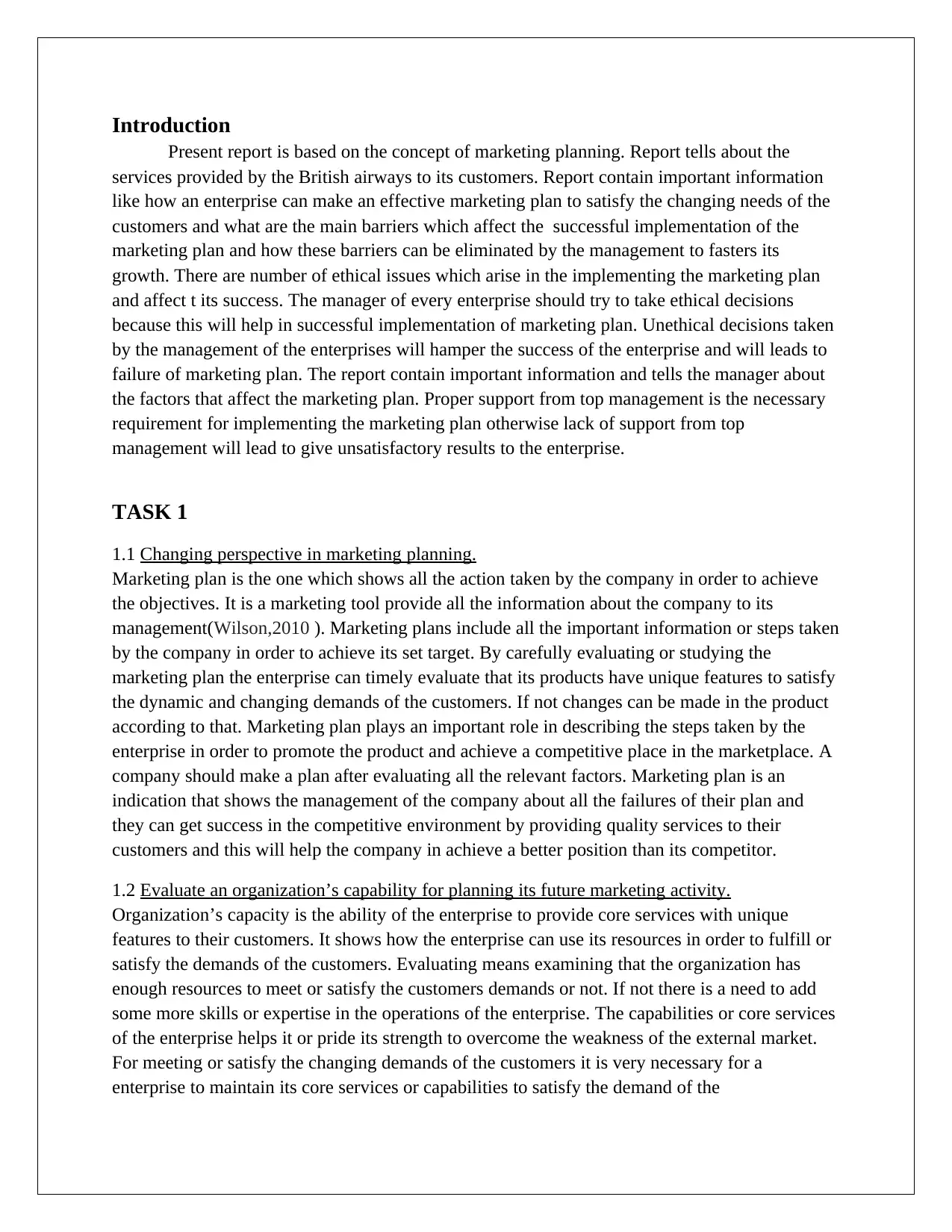
Introduction
Present report is based on the concept of marketing planning. Report tells about the
services provided by the British airways to its customers. Report contain important information
like how an enterprise can make an effective marketing plan to satisfy the changing needs of the
customers and what are the main barriers which affect the successful implementation of the
marketing plan and how these barriers can be eliminated by the management to fasters its
growth. There are number of ethical issues which arise in the implementing the marketing plan
and affect t its success. The manager of every enterprise should try to take ethical decisions
because this will help in successful implementation of marketing plan. Unethical decisions taken
by the management of the enterprises will hamper the success of the enterprise and will leads to
failure of marketing plan. The report contain important information and tells the manager about
the factors that affect the marketing plan. Proper support from top management is the necessary
requirement for implementing the marketing plan otherwise lack of support from top
management will lead to give unsatisfactory results to the enterprise.
TASK 1
1.1 Changing perspective in marketing planning.
Marketing plan is the one which shows all the action taken by the company in order to achieve
the objectives. It is a marketing tool provide all the information about the company to its
management(Wilson,2010 ). Marketing plans include all the important information or steps taken
by the company in order to achieve its set target. By carefully evaluating or studying the
marketing plan the enterprise can timely evaluate that its products have unique features to satisfy
the dynamic and changing demands of the customers. If not changes can be made in the product
according to that. Marketing plan plays an important role in describing the steps taken by the
enterprise in order to promote the product and achieve a competitive place in the marketplace. A
company should make a plan after evaluating all the relevant factors. Marketing plan is an
indication that shows the management of the company about all the failures of their plan and
they can get success in the competitive environment by providing quality services to their
customers and this will help the company in achieve a better position than its competitor.
1.2 Evaluate an organization’s capability for planning its future marketing activity.
Organization’s capacity is the ability of the enterprise to provide core services with unique
features to their customers. It shows how the enterprise can use its resources in order to fulfill or
satisfy the demands of the customers. Evaluating means examining that the organization has
enough resources to meet or satisfy the customers demands or not. If not there is a need to add
some more skills or expertise in the operations of the enterprise. The capabilities or core services
of the enterprise helps it or pride its strength to overcome the weakness of the external market.
For meeting or satisfy the changing demands of the customers it is very necessary for a
enterprise to maintain its core services or capabilities to satisfy the demand of the
Present report is based on the concept of marketing planning. Report tells about the
services provided by the British airways to its customers. Report contain important information
like how an enterprise can make an effective marketing plan to satisfy the changing needs of the
customers and what are the main barriers which affect the successful implementation of the
marketing plan and how these barriers can be eliminated by the management to fasters its
growth. There are number of ethical issues which arise in the implementing the marketing plan
and affect t its success. The manager of every enterprise should try to take ethical decisions
because this will help in successful implementation of marketing plan. Unethical decisions taken
by the management of the enterprises will hamper the success of the enterprise and will leads to
failure of marketing plan. The report contain important information and tells the manager about
the factors that affect the marketing plan. Proper support from top management is the necessary
requirement for implementing the marketing plan otherwise lack of support from top
management will lead to give unsatisfactory results to the enterprise.
TASK 1
1.1 Changing perspective in marketing planning.
Marketing plan is the one which shows all the action taken by the company in order to achieve
the objectives. It is a marketing tool provide all the information about the company to its
management(Wilson,2010 ). Marketing plans include all the important information or steps taken
by the company in order to achieve its set target. By carefully evaluating or studying the
marketing plan the enterprise can timely evaluate that its products have unique features to satisfy
the dynamic and changing demands of the customers. If not changes can be made in the product
according to that. Marketing plan plays an important role in describing the steps taken by the
enterprise in order to promote the product and achieve a competitive place in the marketplace. A
company should make a plan after evaluating all the relevant factors. Marketing plan is an
indication that shows the management of the company about all the failures of their plan and
they can get success in the competitive environment by providing quality services to their
customers and this will help the company in achieve a better position than its competitor.
1.2 Evaluate an organization’s capability for planning its future marketing activity.
Organization’s capacity is the ability of the enterprise to provide core services with unique
features to their customers. It shows how the enterprise can use its resources in order to fulfill or
satisfy the demands of the customers. Evaluating means examining that the organization has
enough resources to meet or satisfy the customers demands or not. If not there is a need to add
some more skills or expertise in the operations of the enterprise. The capabilities or core services
of the enterprise helps it or pride its strength to overcome the weakness of the external market.
For meeting or satisfy the changing demands of the customers it is very necessary for a
enterprise to maintain its core services or capabilities to satisfy the demand of the
⊘ This is a preview!⊘
Do you want full access?
Subscribe today to unlock all pages.

Trusted by 1+ million students worldwide
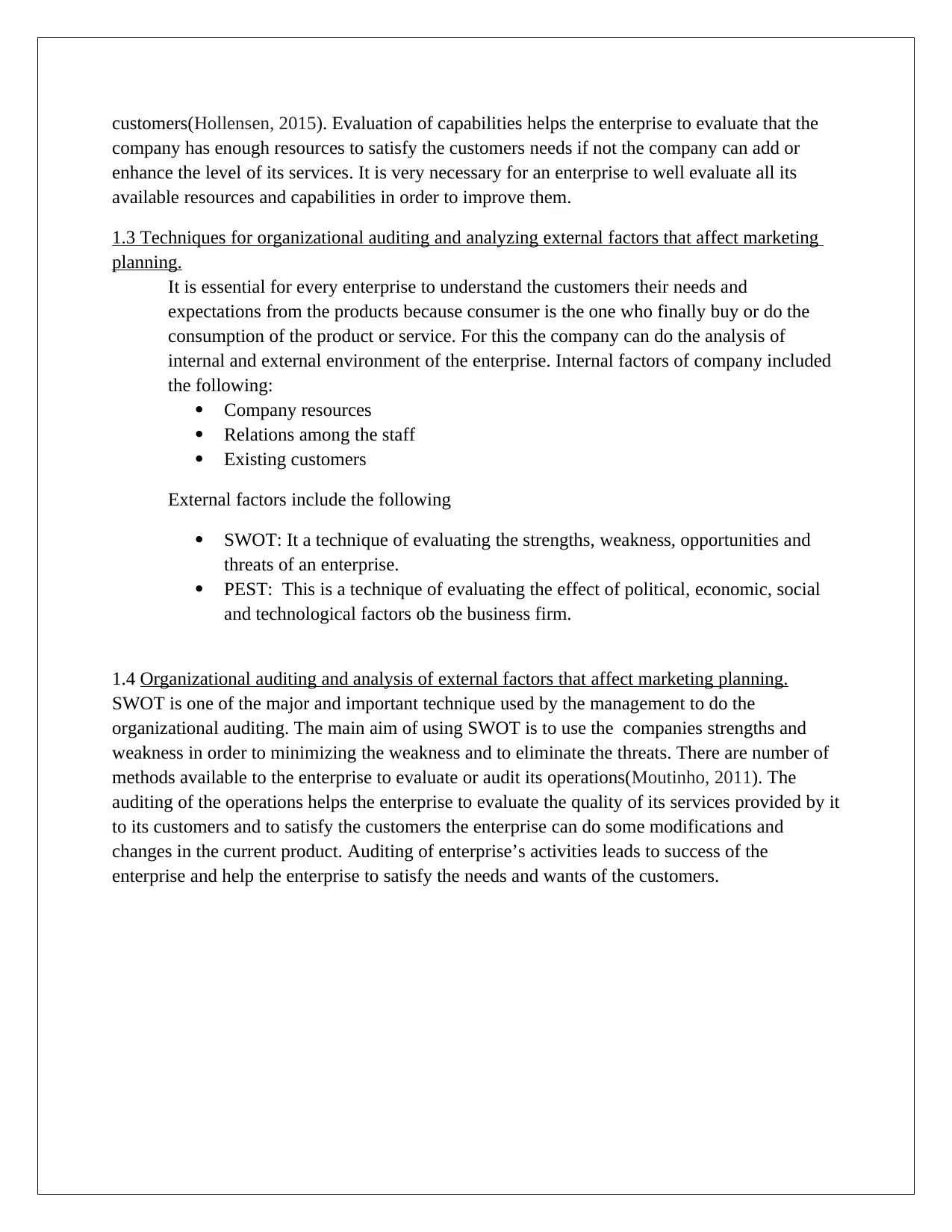
customers(Hollensen, 2015). Evaluation of capabilities helps the enterprise to evaluate that the
company has enough resources to satisfy the customers needs if not the company can add or
enhance the level of its services. It is very necessary for an enterprise to well evaluate all its
available resources and capabilities in order to improve them.
1.3 Techniques for organizational auditing and analyzing external factors that affect marketing
planning.
It is essential for every enterprise to understand the customers their needs and
expectations from the products because consumer is the one who finally buy or do the
consumption of the product or service. For this the company can do the analysis of
internal and external environment of the enterprise. Internal factors of company included
the following:
Company resources
Relations among the staff
Existing customers
External factors include the following
SWOT: It a technique of evaluating the strengths, weakness, opportunities and
threats of an enterprise.
PEST: This is a technique of evaluating the effect of political, economic, social
and technological factors ob the business firm.
1.4 Organizational auditing and analysis of external factors that affect marketing planning.
SWOT is one of the major and important technique used by the management to do the
organizational auditing. The main aim of using SWOT is to use the companies strengths and
weakness in order to minimizing the weakness and to eliminate the threats. There are number of
methods available to the enterprise to evaluate or audit its operations(Moutinho, 2011). The
auditing of the operations helps the enterprise to evaluate the quality of its services provided by it
to its customers and to satisfy the customers the enterprise can do some modifications and
changes in the current product. Auditing of enterprise’s activities leads to success of the
enterprise and help the enterprise to satisfy the needs and wants of the customers.
company has enough resources to satisfy the customers needs if not the company can add or
enhance the level of its services. It is very necessary for an enterprise to well evaluate all its
available resources and capabilities in order to improve them.
1.3 Techniques for organizational auditing and analyzing external factors that affect marketing
planning.
It is essential for every enterprise to understand the customers their needs and
expectations from the products because consumer is the one who finally buy or do the
consumption of the product or service. For this the company can do the analysis of
internal and external environment of the enterprise. Internal factors of company included
the following:
Company resources
Relations among the staff
Existing customers
External factors include the following
SWOT: It a technique of evaluating the strengths, weakness, opportunities and
threats of an enterprise.
PEST: This is a technique of evaluating the effect of political, economic, social
and technological factors ob the business firm.
1.4 Organizational auditing and analysis of external factors that affect marketing planning.
SWOT is one of the major and important technique used by the management to do the
organizational auditing. The main aim of using SWOT is to use the companies strengths and
weakness in order to minimizing the weakness and to eliminate the threats. There are number of
methods available to the enterprise to evaluate or audit its operations(Moutinho, 2011). The
auditing of the operations helps the enterprise to evaluate the quality of its services provided by it
to its customers and to satisfy the customers the enterprise can do some modifications and
changes in the current product. Auditing of enterprise’s activities leads to success of the
enterprise and help the enterprise to satisfy the needs and wants of the customers.
Paraphrase This Document
Need a fresh take? Get an instant paraphrase of this document with our AI Paraphraser
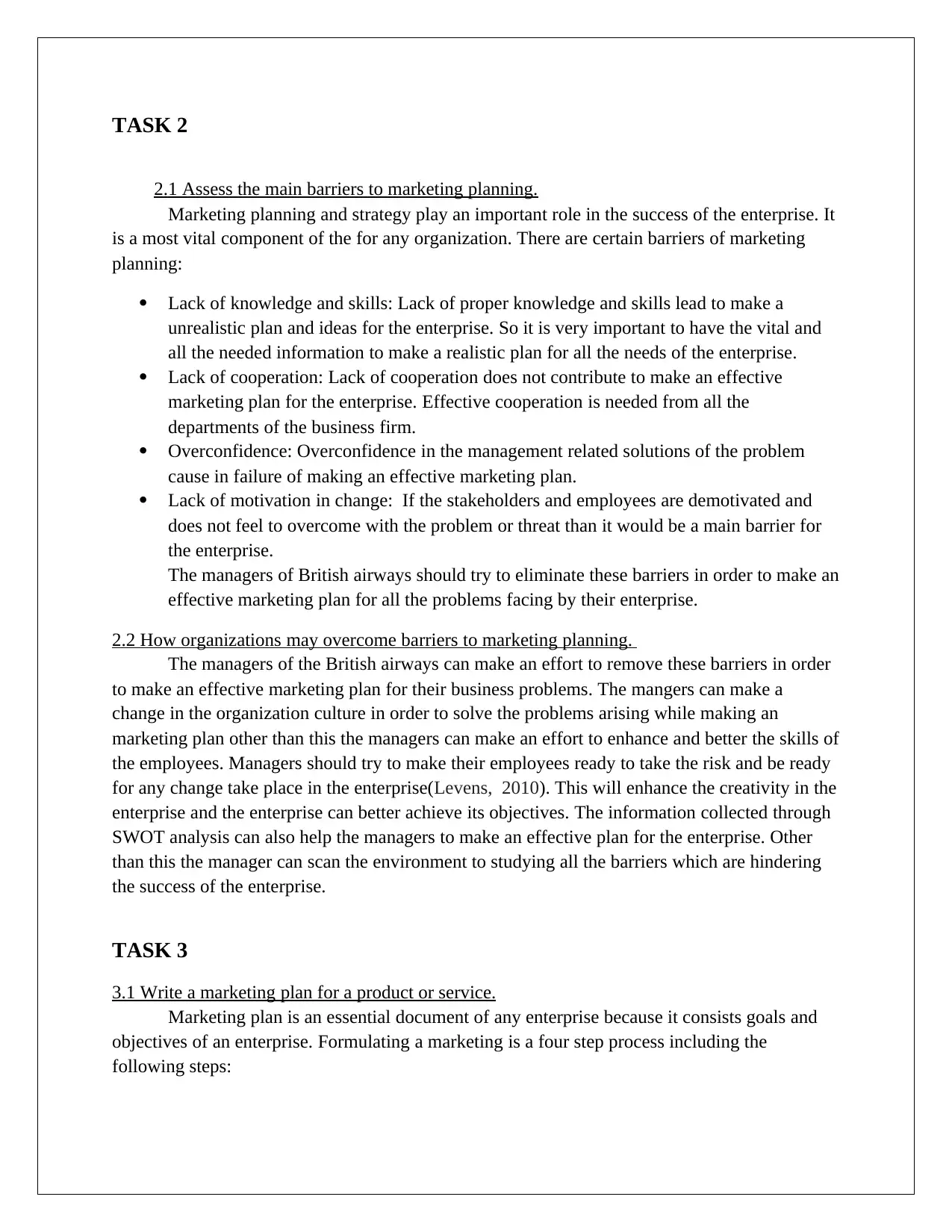
TASK 2
2.1 Assess the main barriers to marketing planning.
Marketing planning and strategy play an important role in the success of the enterprise. It
is a most vital component of the for any organization. There are certain barriers of marketing
planning:
Lack of knowledge and skills: Lack of proper knowledge and skills lead to make a
unrealistic plan and ideas for the enterprise. So it is very important to have the vital and
all the needed information to make a realistic plan for all the needs of the enterprise.
Lack of cooperation: Lack of cooperation does not contribute to make an effective
marketing plan for the enterprise. Effective cooperation is needed from all the
departments of the business firm.
Overconfidence: Overconfidence in the management related solutions of the problem
cause in failure of making an effective marketing plan.
Lack of motivation in change: If the stakeholders and employees are demotivated and
does not feel to overcome with the problem or threat than it would be a main barrier for
the enterprise.
The managers of British airways should try to eliminate these barriers in order to make an
effective marketing plan for all the problems facing by their enterprise.
2.2 How organizations may overcome barriers to marketing planning.
The managers of the British airways can make an effort to remove these barriers in order
to make an effective marketing plan for their business problems. The mangers can make a
change in the organization culture in order to solve the problems arising while making an
marketing plan other than this the managers can make an effort to enhance and better the skills of
the employees. Managers should try to make their employees ready to take the risk and be ready
for any change take place in the enterprise(Levens, 2010). This will enhance the creativity in the
enterprise and the enterprise can better achieve its objectives. The information collected through
SWOT analysis can also help the managers to make an effective plan for the enterprise. Other
than this the manager can scan the environment to studying all the barriers which are hindering
the success of the enterprise.
TASK 3
3.1 Write a marketing plan for a product or service.
Marketing plan is an essential document of any enterprise because it consists goals and
objectives of an enterprise. Formulating a marketing is a four step process including the
following steps:
2.1 Assess the main barriers to marketing planning.
Marketing planning and strategy play an important role in the success of the enterprise. It
is a most vital component of the for any organization. There are certain barriers of marketing
planning:
Lack of knowledge and skills: Lack of proper knowledge and skills lead to make a
unrealistic plan and ideas for the enterprise. So it is very important to have the vital and
all the needed information to make a realistic plan for all the needs of the enterprise.
Lack of cooperation: Lack of cooperation does not contribute to make an effective
marketing plan for the enterprise. Effective cooperation is needed from all the
departments of the business firm.
Overconfidence: Overconfidence in the management related solutions of the problem
cause in failure of making an effective marketing plan.
Lack of motivation in change: If the stakeholders and employees are demotivated and
does not feel to overcome with the problem or threat than it would be a main barrier for
the enterprise.
The managers of British airways should try to eliminate these barriers in order to make an
effective marketing plan for all the problems facing by their enterprise.
2.2 How organizations may overcome barriers to marketing planning.
The managers of the British airways can make an effort to remove these barriers in order
to make an effective marketing plan for their business problems. The mangers can make a
change in the organization culture in order to solve the problems arising while making an
marketing plan other than this the managers can make an effort to enhance and better the skills of
the employees. Managers should try to make their employees ready to take the risk and be ready
for any change take place in the enterprise(Levens, 2010). This will enhance the creativity in the
enterprise and the enterprise can better achieve its objectives. The information collected through
SWOT analysis can also help the managers to make an effective plan for the enterprise. Other
than this the manager can scan the environment to studying all the barriers which are hindering
the success of the enterprise.
TASK 3
3.1 Write a marketing plan for a product or service.
Marketing plan is an essential document of any enterprise because it consists goals and
objectives of an enterprise. Formulating a marketing is a four step process including the
following steps:
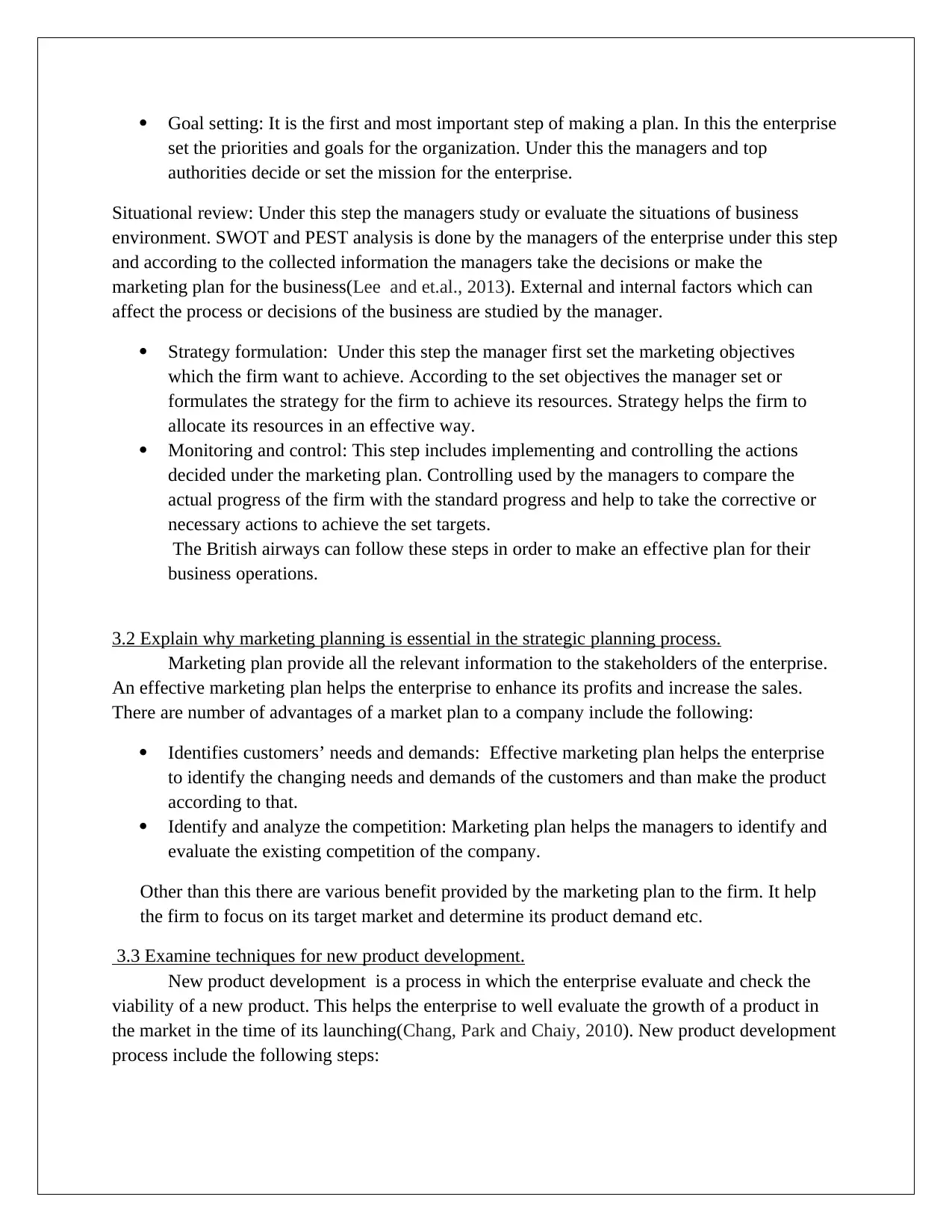
Goal setting: It is the first and most important step of making a plan. In this the enterprise
set the priorities and goals for the organization. Under this the managers and top
authorities decide or set the mission for the enterprise.
Situational review: Under this step the managers study or evaluate the situations of business
environment. SWOT and PEST analysis is done by the managers of the enterprise under this step
and according to the collected information the managers take the decisions or make the
marketing plan for the business(Lee and et.al., 2013). External and internal factors which can
affect the process or decisions of the business are studied by the manager.
Strategy formulation: Under this step the manager first set the marketing objectives
which the firm want to achieve. According to the set objectives the manager set or
formulates the strategy for the firm to achieve its resources. Strategy helps the firm to
allocate its resources in an effective way.
Monitoring and control: This step includes implementing and controlling the actions
decided under the marketing plan. Controlling used by the managers to compare the
actual progress of the firm with the standard progress and help to take the corrective or
necessary actions to achieve the set targets.
The British airways can follow these steps in order to make an effective plan for their
business operations.
3.2 Explain why marketing planning is essential in the strategic planning process.
Marketing plan provide all the relevant information to the stakeholders of the enterprise.
An effective marketing plan helps the enterprise to enhance its profits and increase the sales.
There are number of advantages of a market plan to a company include the following:
Identifies customers’ needs and demands: Effective marketing plan helps the enterprise
to identify the changing needs and demands of the customers and than make the product
according to that.
Identify and analyze the competition: Marketing plan helps the managers to identify and
evaluate the existing competition of the company.
Other than this there are various benefit provided by the marketing plan to the firm. It help
the firm to focus on its target market and determine its product demand etc.
3.3 Examine techniques for new product development.
New product development is a process in which the enterprise evaluate and check the
viability of a new product. This helps the enterprise to well evaluate the growth of a product in
the market in the time of its launching(Chang, Park and Chaiy, 2010). New product development
process include the following steps:
set the priorities and goals for the organization. Under this the managers and top
authorities decide or set the mission for the enterprise.
Situational review: Under this step the managers study or evaluate the situations of business
environment. SWOT and PEST analysis is done by the managers of the enterprise under this step
and according to the collected information the managers take the decisions or make the
marketing plan for the business(Lee and et.al., 2013). External and internal factors which can
affect the process or decisions of the business are studied by the manager.
Strategy formulation: Under this step the manager first set the marketing objectives
which the firm want to achieve. According to the set objectives the manager set or
formulates the strategy for the firm to achieve its resources. Strategy helps the firm to
allocate its resources in an effective way.
Monitoring and control: This step includes implementing and controlling the actions
decided under the marketing plan. Controlling used by the managers to compare the
actual progress of the firm with the standard progress and help to take the corrective or
necessary actions to achieve the set targets.
The British airways can follow these steps in order to make an effective plan for their
business operations.
3.2 Explain why marketing planning is essential in the strategic planning process.
Marketing plan provide all the relevant information to the stakeholders of the enterprise.
An effective marketing plan helps the enterprise to enhance its profits and increase the sales.
There are number of advantages of a market plan to a company include the following:
Identifies customers’ needs and demands: Effective marketing plan helps the enterprise
to identify the changing needs and demands of the customers and than make the product
according to that.
Identify and analyze the competition: Marketing plan helps the managers to identify and
evaluate the existing competition of the company.
Other than this there are various benefit provided by the marketing plan to the firm. It help
the firm to focus on its target market and determine its product demand etc.
3.3 Examine techniques for new product development.
New product development is a process in which the enterprise evaluate and check the
viability of a new product. This helps the enterprise to well evaluate the growth of a product in
the market in the time of its launching(Chang, Park and Chaiy, 2010). New product development
process include the following steps:
⊘ This is a preview!⊘
Do you want full access?
Subscribe today to unlock all pages.

Trusted by 1+ million students worldwide
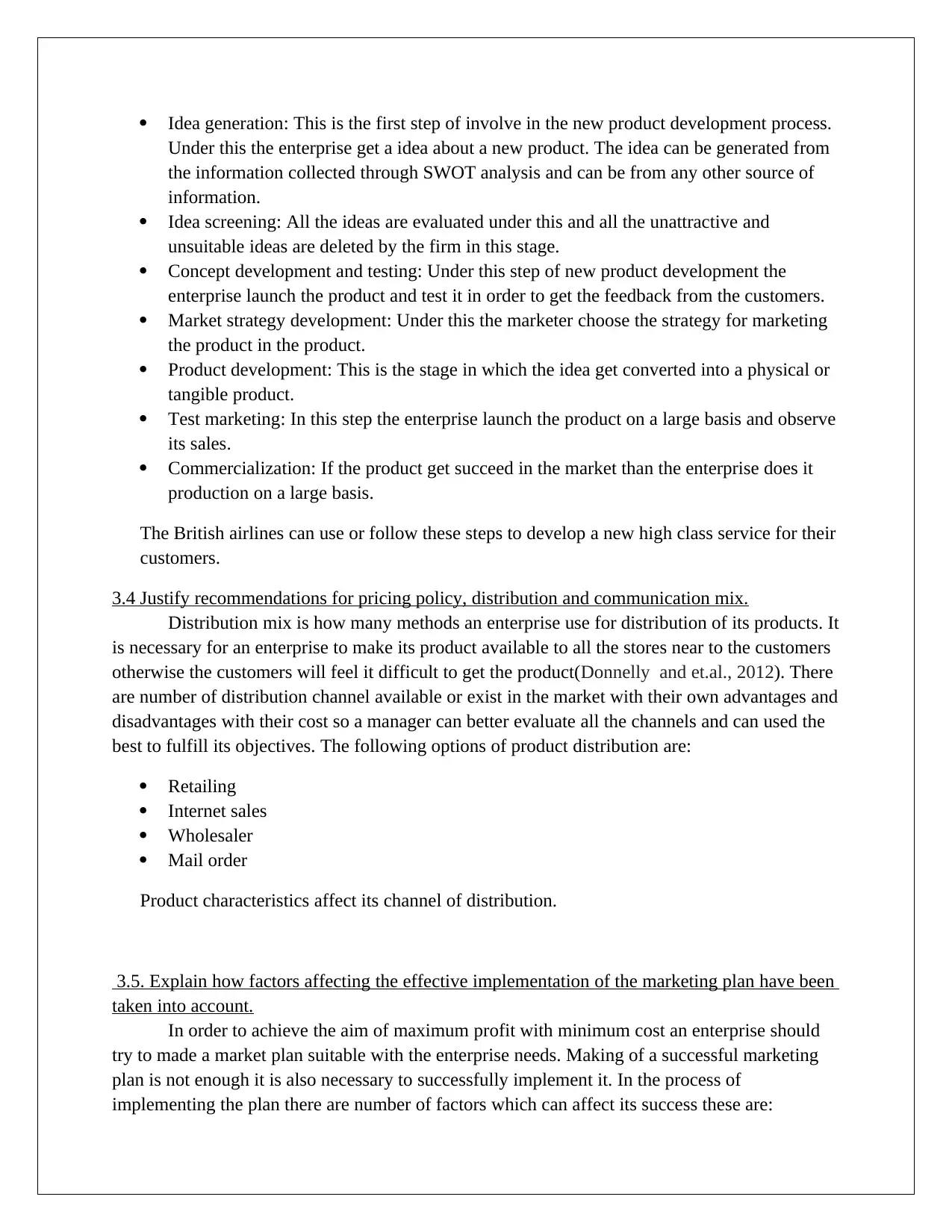
Idea generation: This is the first step of involve in the new product development process.
Under this the enterprise get a idea about a new product. The idea can be generated from
the information collected through SWOT analysis and can be from any other source of
information.
Idea screening: All the ideas are evaluated under this and all the unattractive and
unsuitable ideas are deleted by the firm in this stage.
Concept development and testing: Under this step of new product development the
enterprise launch the product and test it in order to get the feedback from the customers.
Market strategy development: Under this the marketer choose the strategy for marketing
the product in the product.
Product development: This is the stage in which the idea get converted into a physical or
tangible product.
Test marketing: In this step the enterprise launch the product on a large basis and observe
its sales.
Commercialization: If the product get succeed in the market than the enterprise does it
production on a large basis.
The British airlines can use or follow these steps to develop a new high class service for their
customers.
3.4 Justify recommendations for pricing policy, distribution and communication mix.
Distribution mix is how many methods an enterprise use for distribution of its products. It
is necessary for an enterprise to make its product available to all the stores near to the customers
otherwise the customers will feel it difficult to get the product(Donnelly and et.al., 2012). There
are number of distribution channel available or exist in the market with their own advantages and
disadvantages with their cost so a manager can better evaluate all the channels and can used the
best to fulfill its objectives. The following options of product distribution are:
Retailing
Internet sales
Wholesaler
Mail order
Product characteristics affect its channel of distribution.
3.5. Explain how factors affecting the effective implementation of the marketing plan have been
taken into account.
In order to achieve the aim of maximum profit with minimum cost an enterprise should
try to made a market plan suitable with the enterprise needs. Making of a successful marketing
plan is not enough it is also necessary to successfully implement it. In the process of
implementing the plan there are number of factors which can affect its success these are:
Under this the enterprise get a idea about a new product. The idea can be generated from
the information collected through SWOT analysis and can be from any other source of
information.
Idea screening: All the ideas are evaluated under this and all the unattractive and
unsuitable ideas are deleted by the firm in this stage.
Concept development and testing: Under this step of new product development the
enterprise launch the product and test it in order to get the feedback from the customers.
Market strategy development: Under this the marketer choose the strategy for marketing
the product in the product.
Product development: This is the stage in which the idea get converted into a physical or
tangible product.
Test marketing: In this step the enterprise launch the product on a large basis and observe
its sales.
Commercialization: If the product get succeed in the market than the enterprise does it
production on a large basis.
The British airlines can use or follow these steps to develop a new high class service for their
customers.
3.4 Justify recommendations for pricing policy, distribution and communication mix.
Distribution mix is how many methods an enterprise use for distribution of its products. It
is necessary for an enterprise to make its product available to all the stores near to the customers
otherwise the customers will feel it difficult to get the product(Donnelly and et.al., 2012). There
are number of distribution channel available or exist in the market with their own advantages and
disadvantages with their cost so a manager can better evaluate all the channels and can used the
best to fulfill its objectives. The following options of product distribution are:
Retailing
Internet sales
Wholesaler
Mail order
Product characteristics affect its channel of distribution.
3.5. Explain how factors affecting the effective implementation of the marketing plan have been
taken into account.
In order to achieve the aim of maximum profit with minimum cost an enterprise should
try to made a market plan suitable with the enterprise needs. Making of a successful marketing
plan is not enough it is also necessary to successfully implement it. In the process of
implementing the plan there are number of factors which can affect its success these are:
Paraphrase This Document
Need a fresh take? Get an instant paraphrase of this document with our AI Paraphraser
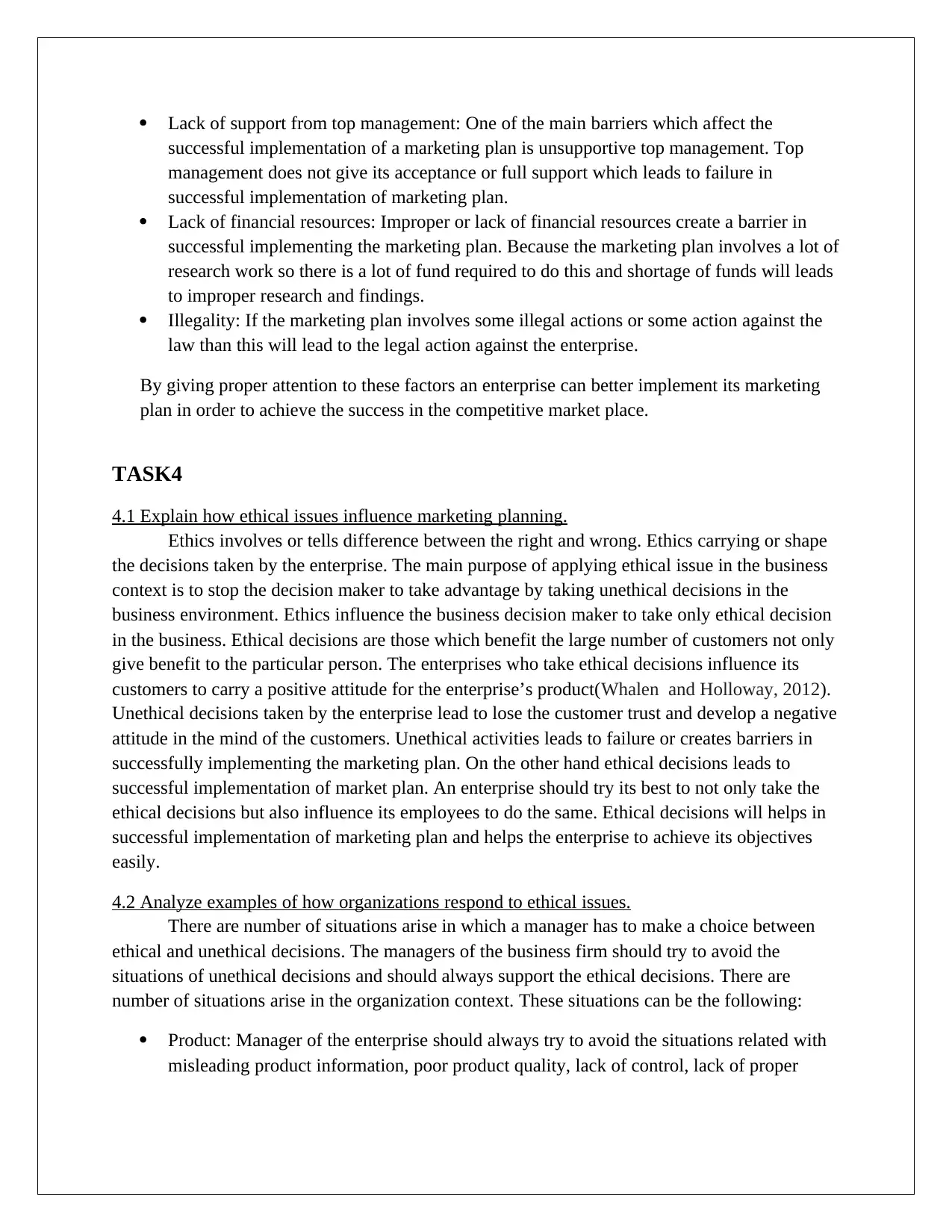
Lack of support from top management: One of the main barriers which affect the
successful implementation of a marketing plan is unsupportive top management. Top
management does not give its acceptance or full support which leads to failure in
successful implementation of marketing plan.
Lack of financial resources: Improper or lack of financial resources create a barrier in
successful implementing the marketing plan. Because the marketing plan involves a lot of
research work so there is a lot of fund required to do this and shortage of funds will leads
to improper research and findings.
Illegality: If the marketing plan involves some illegal actions or some action against the
law than this will lead to the legal action against the enterprise.
By giving proper attention to these factors an enterprise can better implement its marketing
plan in order to achieve the success in the competitive market place.
TASK4
4.1 Explain how ethical issues influence marketing planning.
Ethics involves or tells difference between the right and wrong. Ethics carrying or shape
the decisions taken by the enterprise. The main purpose of applying ethical issue in the business
context is to stop the decision maker to take advantage by taking unethical decisions in the
business environment. Ethics influence the business decision maker to take only ethical decision
in the business. Ethical decisions are those which benefit the large number of customers not only
give benefit to the particular person. The enterprises who take ethical decisions influence its
customers to carry a positive attitude for the enterprise’s product(Whalen and Holloway, 2012).
Unethical decisions taken by the enterprise lead to lose the customer trust and develop a negative
attitude in the mind of the customers. Unethical activities leads to failure or creates barriers in
successfully implementing the marketing plan. On the other hand ethical decisions leads to
successful implementation of market plan. An enterprise should try its best to not only take the
ethical decisions but also influence its employees to do the same. Ethical decisions will helps in
successful implementation of marketing plan and helps the enterprise to achieve its objectives
easily.
4.2 Analyze examples of how organizations respond to ethical issues.
There are number of situations arise in which a manager has to make a choice between
ethical and unethical decisions. The managers of the business firm should try to avoid the
situations of unethical decisions and should always support the ethical decisions. There are
number of situations arise in the organization context. These situations can be the following:
Product: Manager of the enterprise should always try to avoid the situations related with
misleading product information, poor product quality, lack of control, lack of proper
successful implementation of a marketing plan is unsupportive top management. Top
management does not give its acceptance or full support which leads to failure in
successful implementation of marketing plan.
Lack of financial resources: Improper or lack of financial resources create a barrier in
successful implementing the marketing plan. Because the marketing plan involves a lot of
research work so there is a lot of fund required to do this and shortage of funds will leads
to improper research and findings.
Illegality: If the marketing plan involves some illegal actions or some action against the
law than this will lead to the legal action against the enterprise.
By giving proper attention to these factors an enterprise can better implement its marketing
plan in order to achieve the success in the competitive market place.
TASK4
4.1 Explain how ethical issues influence marketing planning.
Ethics involves or tells difference between the right and wrong. Ethics carrying or shape
the decisions taken by the enterprise. The main purpose of applying ethical issue in the business
context is to stop the decision maker to take advantage by taking unethical decisions in the
business environment. Ethics influence the business decision maker to take only ethical decision
in the business. Ethical decisions are those which benefit the large number of customers not only
give benefit to the particular person. The enterprises who take ethical decisions influence its
customers to carry a positive attitude for the enterprise’s product(Whalen and Holloway, 2012).
Unethical decisions taken by the enterprise lead to lose the customer trust and develop a negative
attitude in the mind of the customers. Unethical activities leads to failure or creates barriers in
successfully implementing the marketing plan. On the other hand ethical decisions leads to
successful implementation of market plan. An enterprise should try its best to not only take the
ethical decisions but also influence its employees to do the same. Ethical decisions will helps in
successful implementation of marketing plan and helps the enterprise to achieve its objectives
easily.
4.2 Analyze examples of how organizations respond to ethical issues.
There are number of situations arise in which a manager has to make a choice between
ethical and unethical decisions. The managers of the business firm should try to avoid the
situations of unethical decisions and should always support the ethical decisions. There are
number of situations arise in the organization context. These situations can be the following:
Product: Manager of the enterprise should always try to avoid the situations related with
misleading product information, poor product quality, lack of control, lack of proper
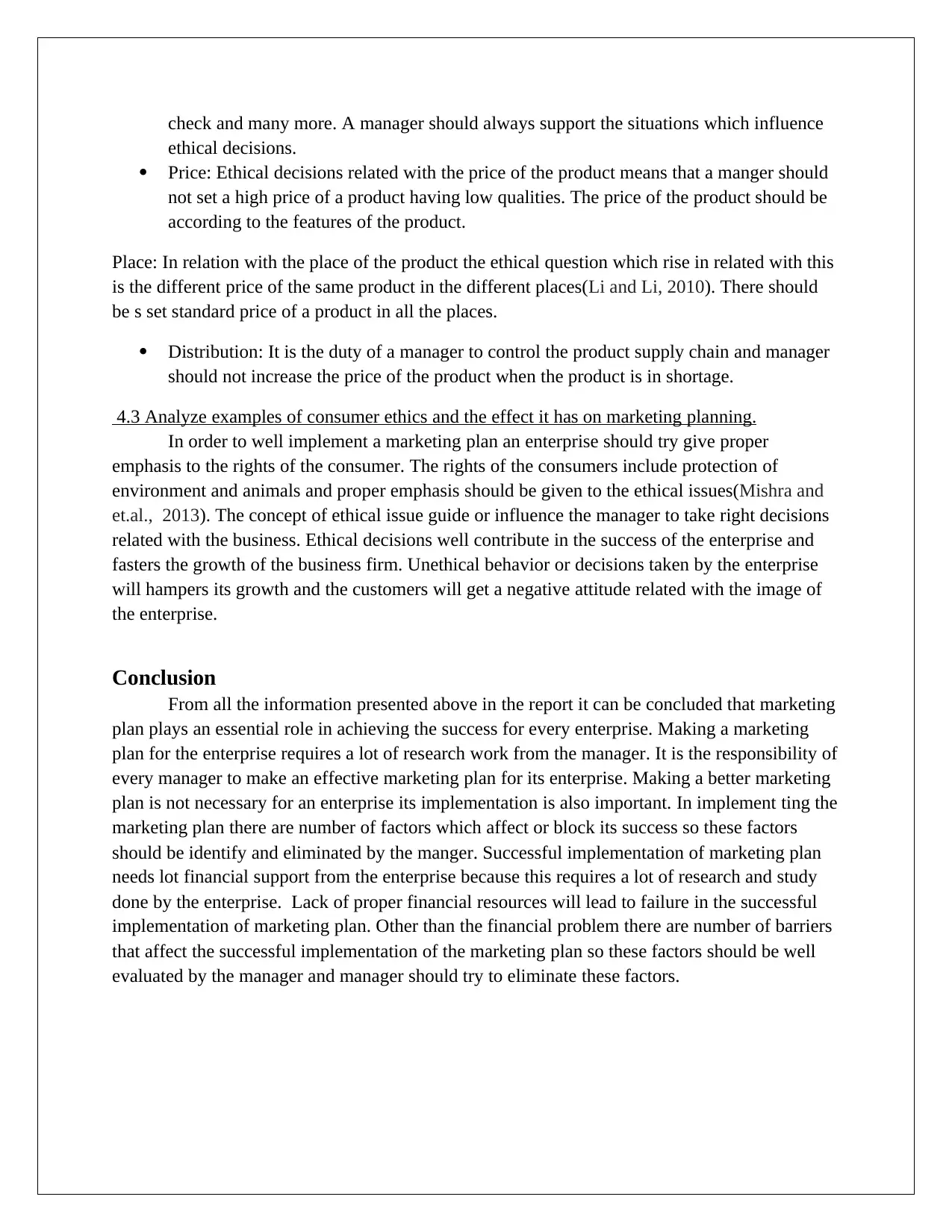
check and many more. A manager should always support the situations which influence
ethical decisions.
Price: Ethical decisions related with the price of the product means that a manger should
not set a high price of a product having low qualities. The price of the product should be
according to the features of the product.
Place: In relation with the place of the product the ethical question which rise in related with this
is the different price of the same product in the different places(Li and Li, 2010). There should
be s set standard price of a product in all the places.
Distribution: It is the duty of a manager to control the product supply chain and manager
should not increase the price of the product when the product is in shortage.
4.3 Analyze examples of consumer ethics and the effect it has on marketing planning.
In order to well implement a marketing plan an enterprise should try give proper
emphasis to the rights of the consumer. The rights of the consumers include protection of
environment and animals and proper emphasis should be given to the ethical issues(Mishra and
et.al., 2013). The concept of ethical issue guide or influence the manager to take right decisions
related with the business. Ethical decisions well contribute in the success of the enterprise and
fasters the growth of the business firm. Unethical behavior or decisions taken by the enterprise
will hampers its growth and the customers will get a negative attitude related with the image of
the enterprise.
Conclusion
From all the information presented above in the report it can be concluded that marketing
plan plays an essential role in achieving the success for every enterprise. Making a marketing
plan for the enterprise requires a lot of research work from the manager. It is the responsibility of
every manager to make an effective marketing plan for its enterprise. Making a better marketing
plan is not necessary for an enterprise its implementation is also important. In implement ting the
marketing plan there are number of factors which affect or block its success so these factors
should be identify and eliminated by the manger. Successful implementation of marketing plan
needs lot financial support from the enterprise because this requires a lot of research and study
done by the enterprise. Lack of proper financial resources will lead to failure in the successful
implementation of marketing plan. Other than the financial problem there are number of barriers
that affect the successful implementation of the marketing plan so these factors should be well
evaluated by the manager and manager should try to eliminate these factors.
ethical decisions.
Price: Ethical decisions related with the price of the product means that a manger should
not set a high price of a product having low qualities. The price of the product should be
according to the features of the product.
Place: In relation with the place of the product the ethical question which rise in related with this
is the different price of the same product in the different places(Li and Li, 2010). There should
be s set standard price of a product in all the places.
Distribution: It is the duty of a manager to control the product supply chain and manager
should not increase the price of the product when the product is in shortage.
4.3 Analyze examples of consumer ethics and the effect it has on marketing planning.
In order to well implement a marketing plan an enterprise should try give proper
emphasis to the rights of the consumer. The rights of the consumers include protection of
environment and animals and proper emphasis should be given to the ethical issues(Mishra and
et.al., 2013). The concept of ethical issue guide or influence the manager to take right decisions
related with the business. Ethical decisions well contribute in the success of the enterprise and
fasters the growth of the business firm. Unethical behavior or decisions taken by the enterprise
will hampers its growth and the customers will get a negative attitude related with the image of
the enterprise.
Conclusion
From all the information presented above in the report it can be concluded that marketing
plan plays an essential role in achieving the success for every enterprise. Making a marketing
plan for the enterprise requires a lot of research work from the manager. It is the responsibility of
every manager to make an effective marketing plan for its enterprise. Making a better marketing
plan is not necessary for an enterprise its implementation is also important. In implement ting the
marketing plan there are number of factors which affect or block its success so these factors
should be identify and eliminated by the manger. Successful implementation of marketing plan
needs lot financial support from the enterprise because this requires a lot of research and study
done by the enterprise. Lack of proper financial resources will lead to failure in the successful
implementation of marketing plan. Other than the financial problem there are number of barriers
that affect the successful implementation of the marketing plan so these factors should be well
evaluated by the manager and manager should try to eliminate these factors.
⊘ This is a preview!⊘
Do you want full access?
Subscribe today to unlock all pages.

Trusted by 1+ million students worldwide
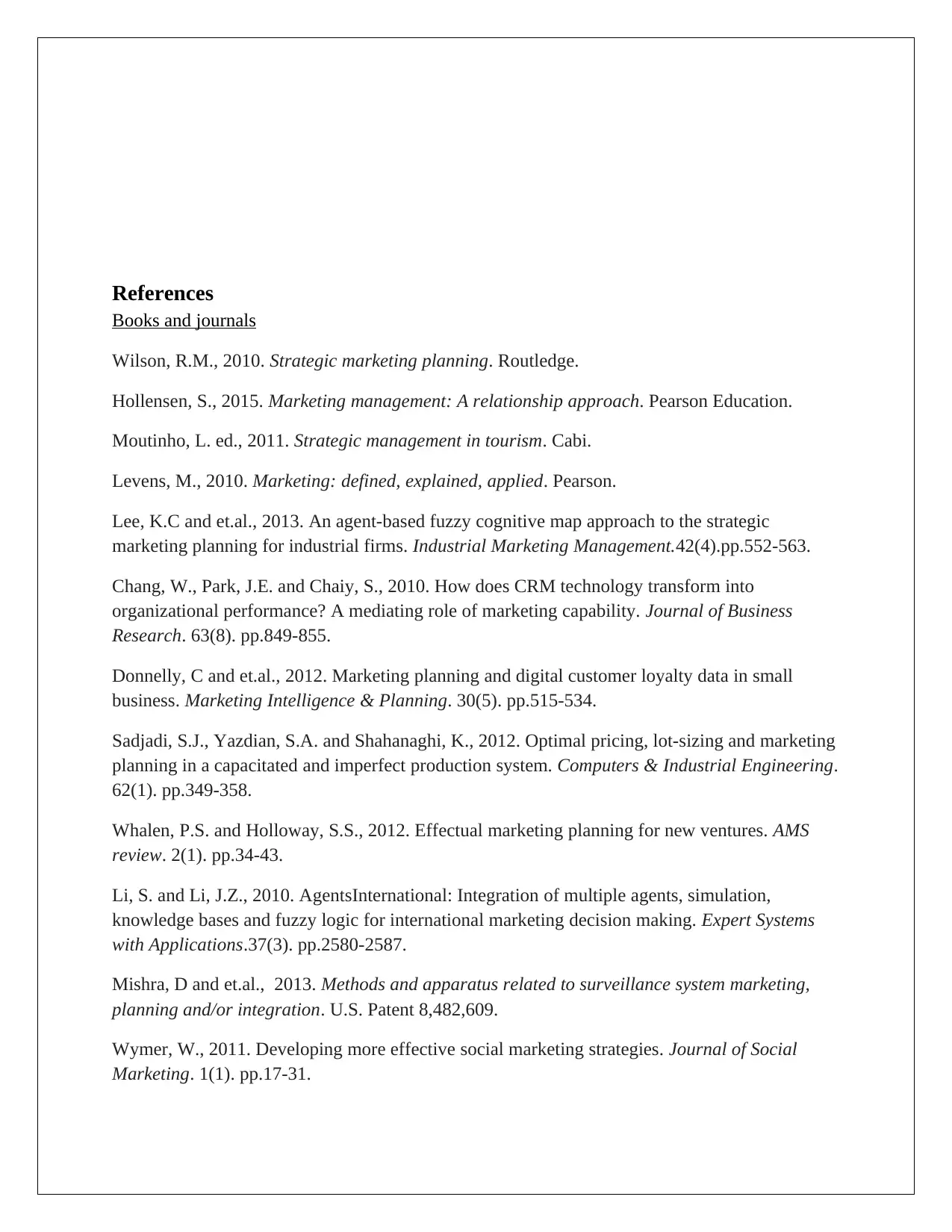
References
Books and journals
Wilson, R.M., 2010. Strategic marketing planning. Routledge.
Hollensen, S., 2015. Marketing management: A relationship approach. Pearson Education.
Moutinho, L. ed., 2011. Strategic management in tourism. Cabi.
Levens, M., 2010. Marketing: defined, explained, applied. Pearson.
Lee, K.C and et.al., 2013. An agent-based fuzzy cognitive map approach to the strategic
marketing planning for industrial firms. Industrial Marketing Management.42(4).pp.552-563.
Chang, W., Park, J.E. and Chaiy, S., 2010. How does CRM technology transform into
organizational performance? A mediating role of marketing capability. Journal of Business
Research. 63(8). pp.849-855.
Donnelly, C and et.al., 2012. Marketing planning and digital customer loyalty data in small
business. Marketing Intelligence & Planning. 30(5). pp.515-534.
Sadjadi, S.J., Yazdian, S.A. and Shahanaghi, K., 2012. Optimal pricing, lot-sizing and marketing
planning in a capacitated and imperfect production system. Computers & Industrial Engineering.
62(1). pp.349-358.
Whalen, P.S. and Holloway, S.S., 2012. Effectual marketing planning for new ventures. AMS
review. 2(1). pp.34-43.
Li, S. and Li, J.Z., 2010. AgentsInternational: Integration of multiple agents, simulation,
knowledge bases and fuzzy logic for international marketing decision making. Expert Systems
with Applications.37(3). pp.2580-2587.
Mishra, D and et.al., 2013. Methods and apparatus related to surveillance system marketing,
planning and/or integration. U.S. Patent 8,482,609.
Wymer, W., 2011. Developing more effective social marketing strategies. Journal of Social
Marketing. 1(1). pp.17-31.
Books and journals
Wilson, R.M., 2010. Strategic marketing planning. Routledge.
Hollensen, S., 2015. Marketing management: A relationship approach. Pearson Education.
Moutinho, L. ed., 2011. Strategic management in tourism. Cabi.
Levens, M., 2010. Marketing: defined, explained, applied. Pearson.
Lee, K.C and et.al., 2013. An agent-based fuzzy cognitive map approach to the strategic
marketing planning for industrial firms. Industrial Marketing Management.42(4).pp.552-563.
Chang, W., Park, J.E. and Chaiy, S., 2010. How does CRM technology transform into
organizational performance? A mediating role of marketing capability. Journal of Business
Research. 63(8). pp.849-855.
Donnelly, C and et.al., 2012. Marketing planning and digital customer loyalty data in small
business. Marketing Intelligence & Planning. 30(5). pp.515-534.
Sadjadi, S.J., Yazdian, S.A. and Shahanaghi, K., 2012. Optimal pricing, lot-sizing and marketing
planning in a capacitated and imperfect production system. Computers & Industrial Engineering.
62(1). pp.349-358.
Whalen, P.S. and Holloway, S.S., 2012. Effectual marketing planning for new ventures. AMS
review. 2(1). pp.34-43.
Li, S. and Li, J.Z., 2010. AgentsInternational: Integration of multiple agents, simulation,
knowledge bases and fuzzy logic for international marketing decision making. Expert Systems
with Applications.37(3). pp.2580-2587.
Mishra, D and et.al., 2013. Methods and apparatus related to surveillance system marketing,
planning and/or integration. U.S. Patent 8,482,609.
Wymer, W., 2011. Developing more effective social marketing strategies. Journal of Social
Marketing. 1(1). pp.17-31.
Paraphrase This Document
Need a fresh take? Get an instant paraphrase of this document with our AI Paraphraser
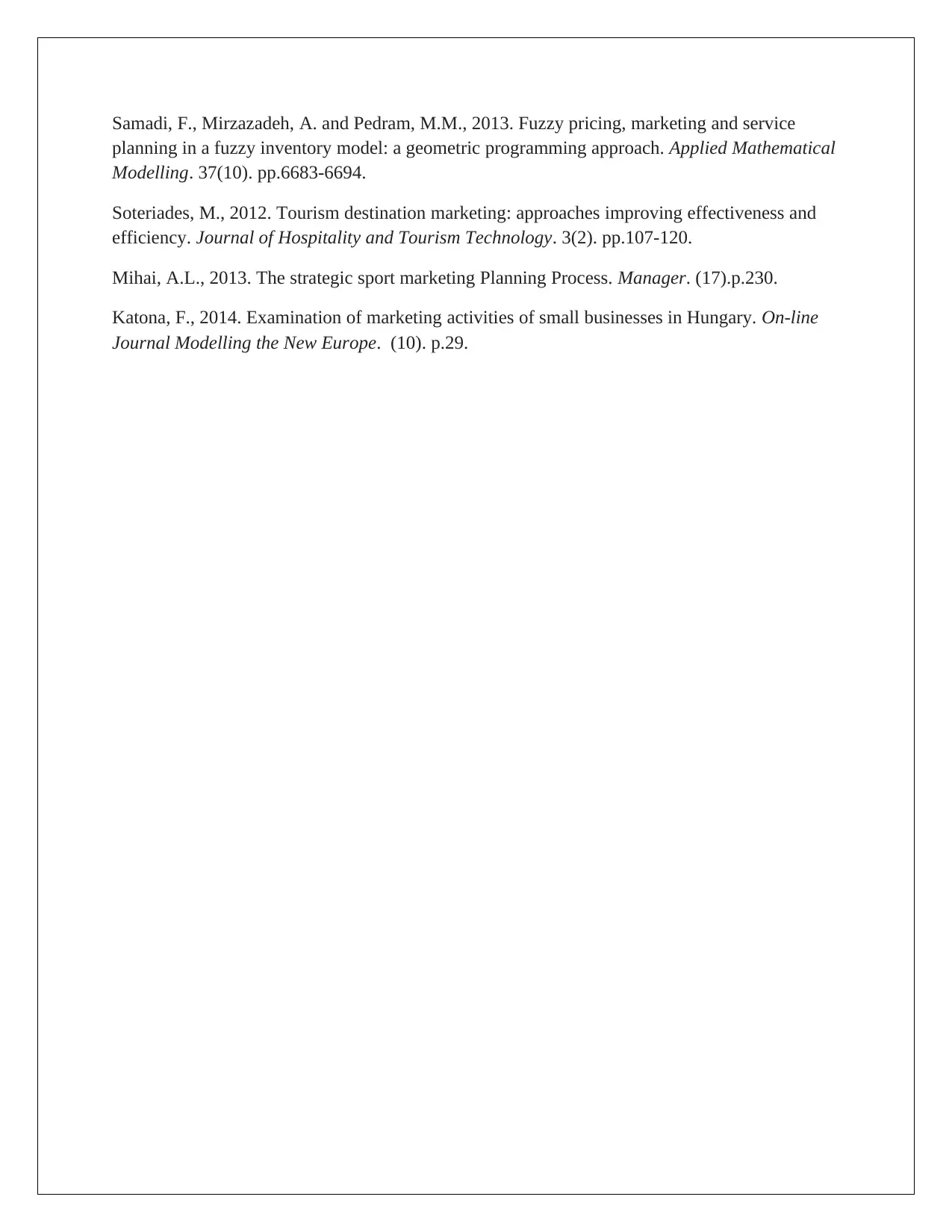
Samadi, F., Mirzazadeh, A. and Pedram, M.M., 2013. Fuzzy pricing, marketing and service
planning in a fuzzy inventory model: a geometric programming approach. Applied Mathematical
Modelling. 37(10). pp.6683-6694.
Soteriades, M., 2012. Tourism destination marketing: approaches improving effectiveness and
efficiency. Journal of Hospitality and Tourism Technology. 3(2). pp.107-120.
Mihai, A.L., 2013. The strategic sport marketing Planning Process. Manager. (17).p.230.
Katona, F., 2014. Examination of marketing activities of small businesses in Hungary. On-line
Journal Modelling the New Europe. (10). p.29.
planning in a fuzzy inventory model: a geometric programming approach. Applied Mathematical
Modelling. 37(10). pp.6683-6694.
Soteriades, M., 2012. Tourism destination marketing: approaches improving effectiveness and
efficiency. Journal of Hospitality and Tourism Technology. 3(2). pp.107-120.
Mihai, A.L., 2013. The strategic sport marketing Planning Process. Manager. (17).p.230.
Katona, F., 2014. Examination of marketing activities of small businesses in Hungary. On-line
Journal Modelling the New Europe. (10). p.29.
1 out of 11
Related Documents
Your All-in-One AI-Powered Toolkit for Academic Success.
+13062052269
info@desklib.com
Available 24*7 on WhatsApp / Email
![[object Object]](/_next/static/media/star-bottom.7253800d.svg)
Unlock your academic potential
Copyright © 2020–2026 A2Z Services. All Rights Reserved. Developed and managed by ZUCOL.





